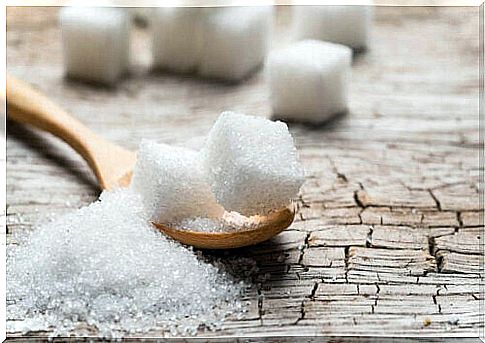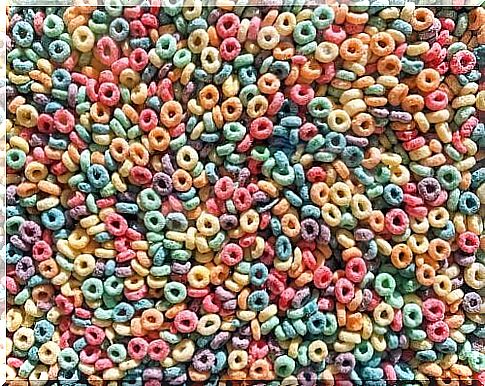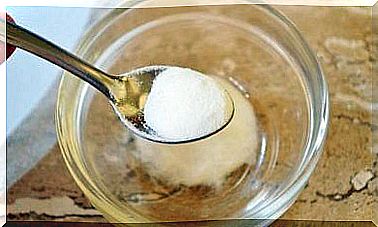Do We Need To Consume Sugar? Find Out The Answer

With the increasing popularity of the ketogenic diet, many people wonder if we really need to consume sugar to keep the body functioning. The truth is that experts have issued different opinions on the subject in recent years. Next, we’ll explain what science has to say.
Before starting, it is important to note that today’s population tends to consume sugar in large amounts. This is mainly due to the increased consumption of ultra-processed industrialized products. Generally, they have a high content of simple sugars and trans fats to improve the organoleptic characteristics of the final product.
What is sugar?

When we talk about sugar, we are referring to a type of simple carbohydrate composed mainly of glucose units linked together.
Although these units can form more complex structures, they generally have a high rate of absorption at the intestinal level. Therefore, they increase the amount of insulin produced, which proves to be harmful in the medium term. Sugars can include the nutrients we’ll discuss next.
monosaccharides
They are sugars classified as simple. Typically, they are made up of a series of glucose molecules held together by single bonds. Its regular intake is associated with a worse state of health, as it would affect metabolic health and the risk of developing excess weight. This was evidenced by a study published in Frontiers in Bioscience.
Disaccharides
Disaccharides are constituted by the union of monosaccharides through an o-glycosidic bond. These have a slightly slower rate of absorption than the former, although they are still considered simple sugars. For this reason, your intake should be limited as much as possible.
Polysaccharides
Polysaccharides are carbohydrates composed mainly of glucose, although they form a network of bonds that significantly increase their molecular weight. For this reason they are considered complex sugars.
Its absorption rate is reduced and therefore the effects it causes in the body vary. These compounds are capable of generating smaller spikes in blood glucose.
How is sugar metabolized in the body?
Carbohydrates reach the small intestine, where they are broken down into simple units by enzymes to be later absorbed. Then, they pass into the blood and, with that, increase blood glucose and stimulate the secretion of insulin, an anabolic hormone that allows the nutrient to be transported to cells or the liver.

If physical activity is performed, the sugar reaches the muscle tissue, where it will be converted into ready-to-use energy. In case the subject is in a resting state, it will be stored in the form of liver or muscle glycogen.
It is worth clarifying that these deposits are limited. As soon as they are saturated, sugar begins to turn into fat for later accumulation in the adipose tissue.
It is necessary to take into account that the aforementioned increase in lipid reserves has been shown to be harmful to health, especially when it exceeds certain levels. From here, inflammatory processes are promoted, linked in many cases to the development of complex pathologies.
What is glucose used for in the body?
As we discussed, glucose is primarily used for the genesis of energy. It is the preferred fuel for anaerobic metabolism pathways and can also be introduced into aerobics.
However, the latter also accept fatty acids, or even glucose without coming from sugar. The latter is formed by physiological processes in which fatty acids and proteins are involved.
It should also be noted that glucose acts as fuel for the brain. Contrary to what was believed until recently, there are other compounds that can perfectly perform this function. An example of them would be the ketone bodies generated during ketosis.
Do we really need to consume sugar?
The truth is that everything seems to indicate that sugar is not necessary in the diet of sedentary people. Even in the case of athletes, its ingestion generates controversy. The body can function perfectly in situations of low carbohydrate consumption. In fact, this type of diet can be beneficial to the body.

Despite all this, we can propose a diet low in sugar and with the presence of complex carbohydrates. For this, the consumption of sweets and ultra-processed foods must be significantly reduced, and that of fresh foods, increased. This situation would be beneficial for the functioning of the organism.
Sugar: a poorly recommended nutrient
As we can see, sugar has little value for the diet and, in a way, we don’t need to consume this nutrient. In fact, most experts advocate the need to reduce their consumption in sedentary individuals. Even in athletes, the option to avoid ingestion is also debated. In this way, metabolic flexibility and performance can be increased in the medium term.
What is clear is that reducing intake through diet has a positive impact on health. This is not to say that you have to cut out carbohydrates completely: you can consume those that have a low glycemic index, meaning the complex ones. They are those found in tubers and legumes, mainly.









